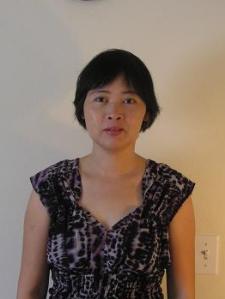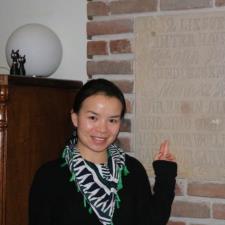a. What would the “combined” pastoral garden look like?
If we merge Peach Blossom Spring and the Garden of Eden into one space, we get a garden that is:
- Chinese in landscape and social organization,
- Western in emotional / religious symbolism,
- and utopian in both a personal and national sense.
You can imagine it like this:
- Geographically it looks like Peach Blossom Spring: a hidden valley, peach trees in bloom, small fields, simple houses, a community cut off from war, capitalism, empire and the modern state. No officials, no exams, no military drills, no foreign humiliation – just a self-sufficient agrarian world.
- But at its center is something like Eden: not a whole village focused on kinship and tradition, but a single couple—the narrator and “his Eve.” In this space, romantic love and sexual desire are innocent rather than sinful or shameful. Nature is not only politically peaceful but also emotionally and erotically safe.
So the “combined” garden is:
- A Chinese-style hidden community (Peach Blossom Spring)
- no war, no imperialism, no oppressive hierarchy
- communal labor, simple living, harmony with nature
- Centered on an Edenic couple (Garden of Eden)
- one man and one woman as the emotional core
- love, sexuality, and intimacy are “pure,” not corrupted by prostitution, money, or national shame
- a sense of being “before the Fall”: before humiliation, before modern fragmentation
In other words, the narrator’s ideal is a Chinese rural utopia reshaped around a Western-style ideal of romantic, innocent coupledom. It’s both:
- National: a purified Chinese landscape and community;
- Personal: a private paradise where he can finally be loved and whole.
b. What modern “political” visions for China are implied?
If Peach Blossom Spring = Chinese paradise and Garden of Eden = Western paradise, then the narrator’s fantasy is more than just escapist; it sketches a politicized dream of what China as a national community could be, especially from a May Fourth–era perspective.
You can tease out at least three intertwined political visions:
1. A China freed from imperialism, militarism, and capitalism
Peach Blossom Spring is famously outside history and outside the state: no wars, no conscription, no officials, no exploitation. For a Chinese student in Japan, humiliated by both foreign power and his own country’s weakness, this becomes a negative image of modern reality:
- Real China: semi-colonial, poor, weak, humiliated.
- Ideal China: like Peach Blossom Spring – self-sufficient, peaceful, untouched by foreign domination or modern exploitation.
By wanting to “return” to that space, the narrator is implicitly longing for a China that is sovereign, unhumiliated, and uncolonized – a national body no longer exposed to ridicule and aggression from others. The pastoral garden becomes a quietly anti-imperialist and anti-capitalist political ideal, even though it’s expressed through private fantasy rather than slogans.
2. A hybrid, East–West model of national renewal
By mixing Chinese Peach Blossom Spring with the biblical Garden of Eden, the narrator isn’t rejecting the West; he’s appropriating Western symbols and inserting them into a Chinese utopia.
That hints at a modern vision where:
- China keeps its cultural core (rural communal harmony, classical landscape, traditional imagery),
- but also absorbs Western emotional and spiritual resources (romantic couple, individual emotional fulfillment, the language of innocence and fall).
Politically, that becomes a kind of hybrid nationalism:
- Not pure rejection of the West,
- but a desire to reshape China by selectively taking Western ideas (individual love, psychological depth, maybe even a hint of Christian moral vocabulary) and grafting them onto a Chinese social body.
It imagines a future China that is cosmopolitan yet rooted, not a submissive colony of Japan or the West, but also not a sealed-off, “purely traditional” museum piece.
3. A nation built on individual feeling rather than only on collective duty
The Eden fantasy is fundamentally about one man and his Eve. That’s a very modern, May Fourth–style emphasis on:
- the individual’s emotions,
- personal happiness, love, and sexual fulfillment,
- rather than ancestral duty, clan hierarchy, or pure sacrifice for the state.
So the political vision buried in this fantasy is that a truly modern Chinese nation should be one in which:
- Individuals—especially sensitive intellectuals like the narrator—
- can live authentically, with emotional and sexual dignity;
- The national community is not just an abstract “China,” but a space where real people’s interior lives matter.
This is political in a negative way too. His inability to realize this ideal—his loneliness, his shame over visiting a prostitute, his final despair—suggests a deep pessimism about China’s capacity to become such a humane, emotionally grounded nation. The story’s title, Sinking, hints that:
- The utopian garden is a dream of national redemption,
- but the reality feels like national and personal drowning.
Putting it together
So, if you read the two paradises as allegories:
- The merged garden = a utopian China that is
- politically independent and peaceful (Peach Blossom Spring),
- emotionally and sexually innocent, centered on a loving couple (Eden),
- and culturally hybrid, drawing on both Chinese and Western sources.
- The political vision the narrator projects is:
- a non-imperialist, non-capitalist, non-militarist China;
- a nation regenerated by a selective fusion of Chinese tradition and Western modernity;
- and a community where the individual’s inner life, love, and dignity can finally be protected.
The tragedy is that in the story this vision exists only as fantasy—precisely because the world he actually inhabits (colonial, modern, alienating) offers him no real way to reach that garden, either as an individual or as a member of the Chinese nation.





